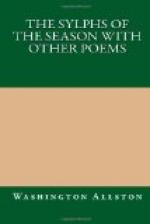Contents.
The Sylphs of the Seasons; a Poet’s Dream
The Two Pointers; a Tale
Eccentricity
The Paint King
Myrtilla: addressed to a Lady, who lamented that
she had never been in love
To a Lady who spoke slightingly of Poets
Sonnet on a Falling Group in the Last Judgment of
Michael Angelo, in the
Cappella Sistina
Sonnet on the Group of the Three Angels before the
Tent of Abraham, by
Raffaelle, in the Vatican
Sonnet, on seeing the Picture of AEolus, by Peligrino
Tibaldi, in the
Institute at Bologna
Sonnet on Rembrant; occasioned by his Picture of Jacob’s
Dream
Sonnet on the Luxembourg Gallery
Sonnet to my venerable Friend, the President of the
Royal Academy
The Mad Lover at the Grave of his Mistress
First Love: a Ballad
The Complaint
Will, the Maniac: a Ballad
The Sylphs of the Seasons;
A Poet’s Dream.
Prefatory Note to The Sylphs of the Seasons.
As it may be objected to the following Poem, that some of the images there introduced are not wholly peculiar to the Season described, the Author begs leave to state, that, both in their selection and disposition, he was guided by that, which, in his limited experience, was found to be the Season of their greatest impression: and, though he has not always felt the necessity of pointing out the collateral causes by which the effect was increased, he yet flatters himself that, in general, they are sufficiently implied either by what follows or precedes them. Thus, for instance, the running brook, though by no means peculiar, is appropriated to Spring; as affording by its motion and seeming exultation one of the most lively images of that spirit of renovation which animates the earth after its temporary suspension during the Winter. By the same rule, is assigned to Summer the placid lake, &c. not because that image is never seen, or enjoyed, at any other season; but on account of its affecting us more in Summer, than either in the Spring, or in Autumn; the indolence and languor generally then experienced disposing us to dwell with particular delight on such an object of repose, not to mention the grateful idea of coolness derived from a knowledge of its temperature. Thus also the evening cloud, exhibiting a fleeting representation of successive objects, is, perhaps, justly appropriated to Autumn, as in that Season the general decay of inanimate nature leads the mind to turn upon itself, and without effort to apply almost every image of sense or vision of the imagination,* to its own transitory state.
If the above be admitted, it is needless to add more; if it be not, it would be useless.
The Sylphs of the Seasons.
Long has it been my fate to hear
The slave of Mammon, with a sneer,
My indolence reprove.
Ah, little knows he of the care,
The toil, the hardship that I bear,
While lolling in my elbow-chair,
And seeming scarce to move:




